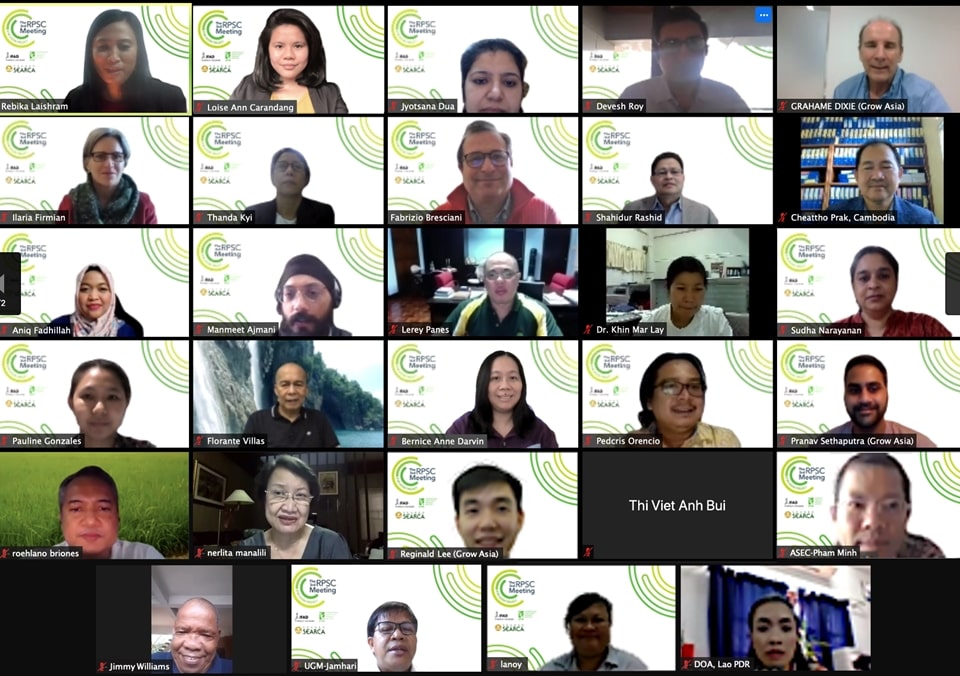 ATMI-ASEAN Project implementers and representatives from regional partners and country partner-institutions in target ASEAN Member States
ATMI-ASEAN Project implementers and representatives from regional partners and country partner-institutions in target ASEAN Member States
The International Food Policy Research Institute (IFPRI), in partnership with the Southeast Asian Regional Center for Graduate Study and Research in Agriculture (SEARCA), organized the 3rd Regional Project Steering Committee (RPSC) Meeting of the International Fund for Agricultural Development (IFAD)-funded project Agricultural Transformation and Market Integration in the ASEAN Region: Responding to Food Security and Inclusiveness Concerns, or ATMI-ASEAN, on 27-28 January 2021 via Zoom. The ATMI-ASEAN Project is being implemented by IFPRI as lead, and SEARCA as partner. The project is already on its fifth year and is anticipating an extension year to complete the project deliverables that were stalled due to the COVID-19 pandemic.
As a follow up to discussions during the previous RPSC Meeting held in Bangkok, Thailand in 2019, the 3rd RPSC Meeting aimed to reflect on the progress of implementation as well as agree on future strategic directions of the ATMI-ASEAN Project. The meeting focused on two objectives: (1) to discuss the project’s technical assistance component in preparation for the development of national- and regional-level roadmaps for strategic agri-food value chains in the five target countries and the ASEAN region; and (2) to endorse project activities and strategies to achieve its intended outcomes, and to provide baselines for developing existing/new laws, regulations, and policies.
The participants were welcomed by Dr. Rashid Shahidur, Director of IFPRI-South Asia and ATMI-ASEAN Project Leader; Dr. Pedcris M. Orencio, Program Head of SEARCA’s Research and Thought Leadership Department (RTLD) and ATMI-ASEAN Project’s Principal Investigator, and; Dr. Fabrizio Bresciani, Lead Regional Economist of the Asia and Pacific Division of IFAD. In their welcome remarks, they expressed gratitude for the contributions from various partner institutions in implementing the project activities and invited everyone to participate in the productive discussions for the two-day event.
During the extension of the project, SEARCA will continuously engage its national focal points for activities related to the preparation of national road maps for the priority commodities identified by the target ASEAN Member States (AMS). Dr. Roehlano M. Briones, a Senior Research Fellow of Philippine Institute for Development Studies (PIDS) and the Lead Technical Consultant of the exercise, provided updates on the timeline of activities and explained the design of the planned exercise towards the development of key national agri-food value chains.
Another major project activity to be led by SEARCA is the regional technical assistance on the development of ASEAN value chain roadmaps. Mr. Jimmy B. Williams, ATMI-ASEAN Project Support Unit (PSU) Coordinator, presented the updates, prospects, and proposed activities for each of the three proposed commodities, namely, cacao, pulses, and maize. Participants from the project’s regional partners such as the Food, Agriculture & Forestry Division (FAFD) of the ASEAN Secretariat represented by Dr. Pham Quang Minh, Grow Asia, and the Asian Partnership for the Development of Human Resources in Rural Asia (AsiaDHRRA), as well as the research fellows from IFPRI-South Asia, contributed to the discussion by providing suggestions on the next steps and way forward for the regional technical assistance component.
SEARCA, through its engaged lead consultants, likewise shared two of its ongoing projects. First is the study on the Implications of ASEAN Economic Community (AEC) and Trade and Investments on Regional Food Security being implemented by Universitas Gadjah Mada (UGM) in Indonesia. Dr. Jamhari, Dean of UGM’s Faculty of Agriculture, discussed the initial results of the study, which highlighted the changes in import and export trends in the AMS before and after the implementation of the AEC.
Second is the Economic Research Institute for ASEAN and East Asia (ERIA)-funded project Enhancing Food Supply Chain Resilience and Food Security in ASEAN with Utilization of Digital Technologies being implemented by SEARCA in partnership with the Association of Southeast Asian Nations (ASEAN). The project’s Technical Consultant, Dr. Nerlita M. Manalili, Managing Director of NEXUS Agribusiness Solutions, shared the background and objectives through which the project was developed, that is, to further strengthen current strategies in place and with consideration of future scenarios.
During the second day, IFPRI presented the studies they have conducted for the ATMI-ASEAN Project, specifically: Farmers Registries in ASEAN Countries; Resilience of Farmer Organizations (FOs); Market Integration with ASEAN and Beyond: The Case of Vietnam; Synthesis Paper on Market Integration of Cambodia, Lao PDR, Myanmar, Vietnam and Philippines; and the Policy Note to Understand Pulse Policies and Landscape and its Implications on Trade of Myanmar. In addition, IFPRI likewise discussed the Network of Policy Advisors and Analysts in the ASEAN Region (NEPAAA), a platform that is being proposed to bring together policy analysts and policy makers in the region, and the High-Level Policy Forum (HLPF), the final activity of the project, which aims to consolidate the results of the research and activities leading to the project’s completion.
With the number of project activities lined up, IFAD, IFPRI, and SEARCA anticipate several knowledge products to be produced in the coming months. SEARCA will engage a Knowledge Management (KM) expert as part of the PSU who will be tasked to consolidate the gains from the policy studies. This is seen as a way to achieve sustainable and institutionalized interventions, which can develop SEARCA’s services and help bring it closer to supporting an inclusive policy development process.
The meeting brought up “great discussions and interesting ideas” to work on while moving forward with the project activities in the target AMSs and in support of the ASEAN initiatives towards the achievement of policies that will support a more inclusive and secured smallholder farmers and their families.